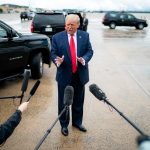As the countdown to the upcoming election ticks away, the world seems more chaotic than ever. With just 50 days until Americans head to the polls, one cannot help but wonder about the current state of affairs under President Joe Biden’s leadership. According to political scholar Victor Davis Hanson, who has an impressive pedigree, including a senior fellowship at the Hoover Institution, there are two glaring issues at play: America’s position in global foreign policy and the implications of recent domestic events.
The first issue to consider is the tumultuous international landscape. The world, once relatively calm during Donald Trump’s administration, appears to be aflame with conflict. The Houthis, Hezbollah, Hamas, and Iran are all keys to unraveling tensions, with Russia’s ongoing situation in Ukraine and China’s ominous threats against Taiwan adding to the fire. It is as though the oceans and seas that previously served as avenues for international trade are now riddled with trepidation—battlegrounds rather than passageways.
Critics assert that under Biden’s leadership, military funding has been significantly weakened. The disassembly of 17 ships and a reported shortage of 45,000 troops suggest that America’s defense may not be as robust as necessary. Coupled with the chaotic withdrawal from Afghanistan and more recent incidents such as the Chinese spy balloon, this administration’s actions have raised concerns about America’s military readiness and credibility on the global stage.
Hanson highlights an essential point: When European nations look at the United States, they may still sympathize with the American left, but they are left to ponder whether the U.S. can lecture them on democracy. The recent efforts to sideline a presidential candidate through lawfare, instead of straightforward electoral competition, have certainly raised eyebrows across the Atlantic. After all, how does a country expect to champion democratic values abroad when it appears to be wrestling with its democratic integrity at home?
In this climate, America’s moral credibility hangs in the balance. With threats from adversarial countries looming ever closer, one has to question what the U.S. response would be if faced with aggression from the likes of Russia, China, or Iran. Waiting for a directive from the President only to hear the unyielding command of “don’t” leaves many wondering how effective such a stance truly is in deterring aggression. The response can come across as laughable when juxtaposed against the very real and escalating threats.
As the election approaches and the stakes grow ever higher, voters must consider these pressing insights. Amid a world teetering on the edge and a home front fraught with existential questions about democracy, folks will be tasked with deciding who they believe can restore America’s standing in both areas. The world is indeed watching, and the decision made this November will echo far beyond the borders of the United States.




